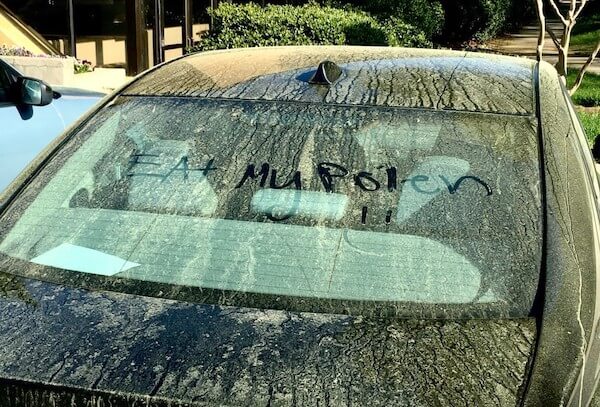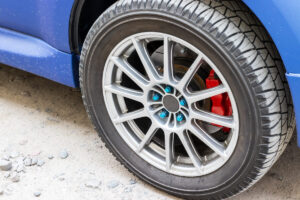
During the summer months, the flowers and trees start to bloom, creating a film of yellow pollen all over your BMW. This is more than just an annoyance. It can damage your paint and get into the engine, blocking up filters and causing severe problems. There are a few ways you can make sure that this doesn’t happen.
Your best defense is to wash and wax your car. If you do this, it will be harder for the pollen to stick to the vehicle. When you’re doing this, make sure to get into every crevice. Don’t forget to clean off the windshield blades. These can catch the pollen and spread it across the windscreen. Often, you’ll just need to use a paper towel to clean it off.
It’s also important to check the air filter system. These will collect all the pollen and debris. It’s recommended that you get a mechanic to clean the air filters every 15,000 miles.
Get Your BMW Summer Ready
The summer months can be a lot of fun. We can go swimming or enjoy an icy drink, but it’s not as much fun for our cars. There is a genuine risk that your engine can overheat, plus the AC needs to work harder to keep you cool. So, how should you get your BMW ready for the hot Arkansas weather?
First, you’ll want to check the Air Conditioning system and battery. You should also make sure that your tire pressure is at the recommended level for your car and get your wheels aligned. You’ll also need to protect your car from pollen by cleaning, waxing, and checking the air filters.
A few simple measures will protect your car from hotter temperatures. Here’s how you can have a summer tune-up for your BMW.
1. Check Your Air Conditioning
During the hotter months, more stress is placed on the car’s air conditioning system. Because of this, you must give it a check-up.
There are a few things that you can look for. First, make sure that the coolant is filled. As you’re doing this, check for any cracks that might have formed around the radiator. Your AC system will have filters to stop larger debris from entering the system. You might need to clean or replace these filters.
Next, you’ll want to check the belts and hoses. These play an essential role in the cooling system, carrying the coolant throughout the engine. Hoses can have cracks or get clogged. Sometimes, you will see shiny points on the belts. These are signs of heat stress. If you spot these problems, it’s time to replace them.
During the summer, there are a few signs to look out for. First, you might notice that the air blowing from your air conditioner might be cool but not cold enough, or even hot. This can indicate that the compressor clutch is no longer working properly or you may need more refrigerant. It’s also important to monitor any strange smells. An issue with the filter can cause an odd scent. If you are experiencing any of these symptoms, it’s best to consult with an experienced mechanic. They can diagnose and fix the problem.

2. Keep Your Tires At The Right Air Pressure
During the summer, the higher temperatures will increase the air pressure inside the tires. This can cause the wear to become uneven. As a result, you’ll need to check the PSI when you are filling them up. Most tires will need to be kept at 35 PSI, but you should consult your vehicles user manual for the proper PSI for your tires.
During the summer, it’s best to try and park your car in a shadier spot. If left in direct sunlight all day, the tires will heat up, and the PSI will increase.
Before heading on a road trip, you might want to get your tire aligned first. If they aren’t in the proper alignment, it can make it harder to control the car. You might find it drifting to one side as you are driving. A visit to your local mechanic will be able to solve this problem. It’s recommended that you align your tires every two to three years. It would be best if you also got it done when you get new tires.
3. Check Your Car Battery
During the summer months, there will be more pressure placed on your car battery. Because of this, it’s essential to check that it is in good condition.
You will need to use a multimeter to check the battery. As you’re doing this, make sure that no metal objects touch the battery terminal. This has the potential to damage the battery. Touch the red end to the positive side of the battery. Put the black end on the negative terminal. You should see a readout of 12.6V. If it’s less than this, you might want to take out the battery and charge it.
Sometimes, you will see signs of rusting or corrosion. This means that you’ll need to remove and replace the battery. If you are uncomfortable doing this yourself, call a trusted mechanic and schedule an appointment.
How Does Hotter Weather Affect Engine Performance?
Ideally, the hotter temperature won’t have any impact on the performance of your BMW. But if you are experiencing any issues, you should bring your car into your local BMW expert to prevent any problems from getting worse.
You should never ignore the signs of engine trouble. This can include things like unusual noises or warning lights on the dash. Sometimes, you will see that there is different colored smoke coming out of the exhaust. Furthermore, the car can start to develop a rougher ideal. Whenever you spot these problems, it’s essential to visit a mechanic. They can investigate and tell you what is wrong.
How Can You Reduce the Chances That Your Engine Will Overheat?
One of the biggest risks is that the engine will overheat in the summer. This can lead to lasting damage and expensive repair bills. There are a few simple ways that you can reduce the chances of this happening.
First, you should check the cooling system. As we mentioned, you’ll need to look for any holes in the pipes or signs of wear on the belts. Check the fluids in the engine. You’ll want to make sure that you’re checking the fluids every month during the summer.
Another good tip is to change the way that you are parking your car. As mentioned, it can be a good idea to park the car in the shade. It’s also important to keep an eye on the temperature gauge. This is especially important on longer drives. On longer road trips, it can be a good idea to pull over. This will give the engine some time to cool down. Usually, it will take around 30 minutes for the car to cool down. If your car does end up overheating, you shouldn’t keep driving it. This can do even more damage. Give it some time to cool down and call a tow truck.
Final Thoughts
The hotter weather can put more pressure on the engine of your car. If you’re not prepared, it can cause problems. Thankfully, there are lots of simple things, like checking fluids and air filters, which can get your car ready for summer. So, before you head off on a road trip this summer, use these tips to make sure that your BMW is prepared for the journey! Give us a call at (501) 214-1091 to schedule your appointment in North Little Rock, Arkansas!



